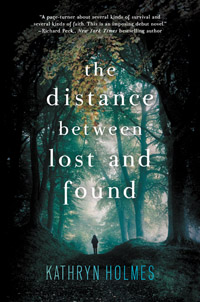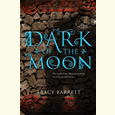Finding Yourself by Getting Lost
Kathryn Holmes’s Hallelujah Calhoun must fight her way out of the woods—and the darkness in her past
The Distance Between Lost and Found, a debut YA novel by Maryville native Kathryn Holmes, combines a survival narrative and a coming-of-age tale when a teen lost in the Smoky Mountains finally comes to grips with a bully from her past. As the novel opens, Hallelujah Calhoun can hardly remember what it was like to have friends. Her best friend has moved away, and her best guy-friend, Jonah, has allied himself with Luke, Hallie’s tormentor and the source of vicious rumors that have driven a wedge between Hallie and the rest of her former friends.
 Hallie once loved to sing, but now she can hardly talk. She once joked with her friends from school and church, but now she’s the target of nastiness masquerading as jokes. In her desperation to reunite with her former friends, she agrees to attend a church-based hiking camp, even though it means being in close proximity to Luke, whose cruelty to her is intensified by the lax supervision of the adults in charge. Once there, Rachel, a new girl at camp—friendly and funny and unaware of how the others feel about Hallie—invites Hallie to sneak out with her and join a clandestine party that Luke has organized after curfew some distance from their dorm. When the other girls see Rachel being friendly with Hallie, they turn on Rachel as well. Rather than take their meanness passively, as Hallie has done for months, Rachel heads back to camp. Hallie joins her, and Jonah does too.
Hallie once loved to sing, but now she can hardly talk. She once joked with her friends from school and church, but now she’s the target of nastiness masquerading as jokes. In her desperation to reunite with her former friends, she agrees to attend a church-based hiking camp, even though it means being in close proximity to Luke, whose cruelty to her is intensified by the lax supervision of the adults in charge. Once there, Rachel, a new girl at camp—friendly and funny and unaware of how the others feel about Hallie—invites Hallie to sneak out with her and join a clandestine party that Luke has organized after curfew some distance from their dorm. When the other girls see Rachel being friendly with Hallie, they turn on Rachel as well. Rather than take their meanness passively, as Hallie has done for months, Rachel heads back to camp. Hallie joins her, and Jonah does too.
Matters turn grim when the trio takes several wrong turns, winding up thoroughly lost in the mountains. They’ve packed nothing but snacks, and the situation goes from grim to dire after an encounter with a bear, a thunderstorm, and several injuries. It takes courage, ingenuity, and sheer determination for these characters to survive and take care of one another, but the challenges Holmes sets for them are realistic, the solutions all within the range of intelligent and determined teenagers.
 Since they have set out from a church camp, it’s not surprising that the three spend some time wondering about the existence of a God who would allow them to be in a situation where they could quite possibly die. These discussions are not heavy-handed, and the characters are spread out on the spectrum of belief, with no judgment made on any of their statements.
Since they have set out from a church camp, it’s not surprising that the three spend some time wondering about the existence of a God who would allow them to be in a situation where they could quite possibly die. These discussions are not heavy-handed, and the characters are spread out on the spectrum of belief, with no judgment made on any of their statements.
As the teens battle the elements and their own fears, Hallie reveals her secret shame—an act by Luke that he blamed on her. This is the lie that has caused Hallie to lose the trust of her parents and church leaders, as well as the respect of her peers—though, unaccountably, she has never tried to dispute it. Hallie seems to have been a self-confident girl until this incident, with friends and the support of loving parents, who were so overjoyed at her birth that they named her “Hallelujah.” So why doesn’t she tell everyone that Luke is lying from the beginning?
It’s unaccountable, that is, until the relative roles of males and females in Hallie’s world become clear. In this culture, the primacy of boys and men is never questioned. The chaperones at camp are all men, even though half the campers are girls. When the hikers need to cross a stream, one of the chaperones says, “Brad, why don’t you take Madison and Kelsey across first?”—as though girls aren’t as sure-footed as boys. When the three main characters are lost in the woods, the girls defer to Jonah, though he knows less than they do. Hallie, an aspiring chef, is aware that dandelions are edible, for example, but no one takes a bite until Jonah pronounces, “I don’t think these’ll kill us. At most we’ll get the runs.” The girls never question his taking the leading role despite the fact that Hallie is the one who has found this source of food.
Most telling of all, though, is the way a girl’s reputation is so fragile that a boy’s accusation of wrongdoing is never questioned. Given the assumptions about males and females in this world, it’s not surprising that Hallie has kept silent for so long: she simply realizes there’s no point in trying to defend herself. Eventually, thanks to this life-or-death experience in the woods, however, she does come to recognize her own role in the scandal: “What makes me the maddest is that … I didn’t stand up for myself.” We can only hope that young readers of The Distance Between Lost and Found will take heart themselves from Hallie’s decision to speak out, finally, and set the record straight.

Tracy Barrett is a writer who lives in Nashville. Her tenth novel, a young-adult retelling of Cinderella entitled The Stepsister’s Tale, was published in 2014 by Harlequin TEEN.


